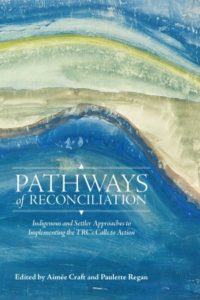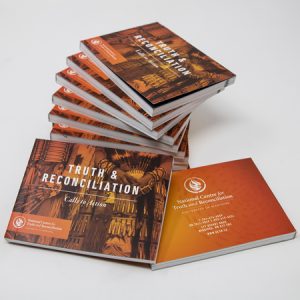Publications
Perceptions on Truth and Reconciliation Series
The University of Manitoba Press and the National Centre for Truth and Reconciliation (NCTR) are pleased to publish the Perceptions on Truth and Reconciliation Series.
Formerly headed by co-editors Aimée Craft and Paulette Regan, this publication series helps to bridge the knowledge gap between Western and Indigenous approaches to addressing historical and ongoing injustices in settler-colonial states, repairing harms, and mitigating conflict within all parts of society.
The series also aims to generate new knowledge about how divided societies can design and implement more robust reconciliation mechanisms and processes to enable the creation of just and peaceful co-existence among diverse peoples in Canada and around the world.
For other NCTR publications, browse the archives for reports, research and publications with our partners.
Recent Publications
A Knock on the Door: the Essential History of Residential Schools from the Truth and Reconciliation Commission of Canada
It can start with a knock on the door one morning. It is the local Indian agent, or the parish priest, or, perhaps, a Mounted Police officer… The officials have arrived and the children must go.
So began the school experience of many Indigenous children in Canada for more than a hundred years, and so begins the history of residential schools prepared by the Truth and Reconciliation Commission of Canada (TRC).
Between 2008 and 2015, the TRC provided opportunities for individuals, families, and communities to share their experiences of residential schools. The commission released several reports based on 7,000 Survivor statements, five million documents from government, churches, and schools as well as secondary sources.
A Knock on the Door, abridged from the TRC Report, with a Foreword by Phil Fontaine and Afterword by Aimée Craft, published in collaboration with the National Centre for Truth and Reconciliation, presents the essential history and legacy of residential schools and informs the journey to reconciliation that Canadians are now on. An afterword introduces the holdings and opportunities of the NCTR, home to the archive of recordings and documents collected by the TRC.
In 2021, an audiobook narrated by Michelle St. John was released.

Pathways to Truth and Reconciliation: Indigenous and Settler Approaches to Implementing the TRC’s Calls to Action
This second release from the NCTR’s publication series Perceptions on Truth and Reconciliation is an exciting one. The essays in Pathways of Reconciliation address the themes of healing, truth and justice before reconciliation, Indigenous knowledge and practices of reconciliation, field-based research, the TRC framework, international dimensions, and measurement and evaluation.
The essays also engage with different approaches to reconciliation (within a variety of reconciliation frameworks, either explicit or implicit) and illustrate the complexities of the reconciliation process itself. They canvass multiple and varied pathways of reconciliation, from Indigenous and non-Indigenous perspectives, reflecting a diversity of approaches to the mandate given to all Canadians by the TRC with its Calls to Action.
TRC mini booklets
With over 300,000 mini booklets supplied to government organizations, not-for-profits and a wide range of other groups across the country, these booklets have proven to be an invaluable tool to advance understanding on the 10 Principles of reconciliation, the United Nations Declaration on the Rights of Indigenous Peoples and the 94 Calls to Action.
Submissions
Have an idea or book project to submit? Can you suggest a new title for the series? The series editors are welcoming all enquiries and proposals. Read our guidelines for book proposals.
Contact:
Kaila JohnstonSupervisor of Education, Outreach and Public Programming
Email: nctr@umanitoba.ca
NCTR’s spirit name – bezhig miigwan, meaning “one feather”.
Bezhig miigwan calls upon us to see each Survivor coming to the NCTR as a single eagle feather and to show those Survivors the same respect and attention an eagle feather deserves. It also teaches we are all in this together — we are all one, connected, and it is vital to work together to achieve reconciliation.


